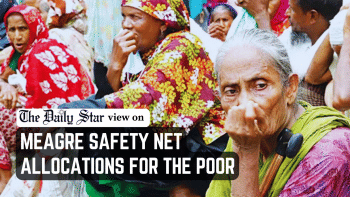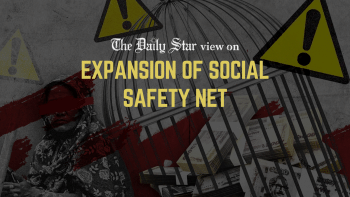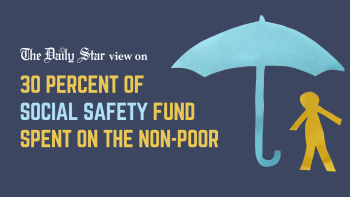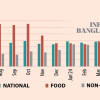Time to equip the poor with a basic income

As the rising prices of essentials continue to strain household budgets, it's time for the government to rethink its approach to social safety net programmes (SSNPs). Introducing a Universal Basic Income (UBI) scheme for vulnerable populations, as recently recommended by the Centre for Policy Dialogue (CPD), could provide much-needed relief and help address structural poverty in the country.
According to a CPD study, providing Tk 4,540 per month to approximately 1.47 crore families—or 35.90 percent—across the country could reduce overall poverty by 6.13 percent. Using a poverty scorecard tailored to Bangladesh's context, the study assessed multiple indicators such as type of residence, energy consumption, health conditions, education expenses, etc. It also recommended differentiated poverty thresholds for urban and rural populations, highlighting the disproportionate exclusion of urban poor under the existing SSNPs. Urban migration, driven by climate change and dwindling rural job opportunities, is also exacerbating this issue.
Currently, the government operates around 140 SSNPs, but their effectiveness has been consistently marred by inefficiencies and irregularities. Issues such as exclusion and inclusion errors, corruption, politicisation and a cumbersome delivery process are leaving many deserving individuals without support. Additionally, the meagre sums provided under these programmes every month fail to sustain beneficiaries for even a week. In this context, UBI, offered at the household level, could better address these shortcomings, particularly during times of high inflation and food insecurity.
However, financing a UBI programme—estimated to cost Tk 75,000 crore annually, or 54 percent of the current SSNP budget—will no doubt be challenging. A significant portion of that budget is allocated to areas unrelated to poverty alleviation, such as pensions for retired government employees, interest payments on national savings certificates, agricultural subsidies, and SME interest subsidies. Rationalising these expenditures could free up funds, but any reallocation must be carefully planned to avoid destabilising those sectors.
Unlike fragmented SSNPs, a well-implemented UBI programme could reduce systemic inefficiencies while empowering vulnerable populations to make better economic and social decisions, ultimately contributing to the country's progress. Therefore, our vision for social protection must extend beyond providing alms. With several reputed economists now leading key ministries under the interim government, this is an opportune moment to take bold steps like UBI. At the same time, the government must address anomalies in social safety net budgeting and resolve issues related to beneficiary selection and fund disbursement. A transparent and centralised approach to social protection can create a pathway towards long-term poverty alleviation.


 For all latest news, follow The Daily Star's Google News channel.
For all latest news, follow The Daily Star's Google News channel. 











Comments